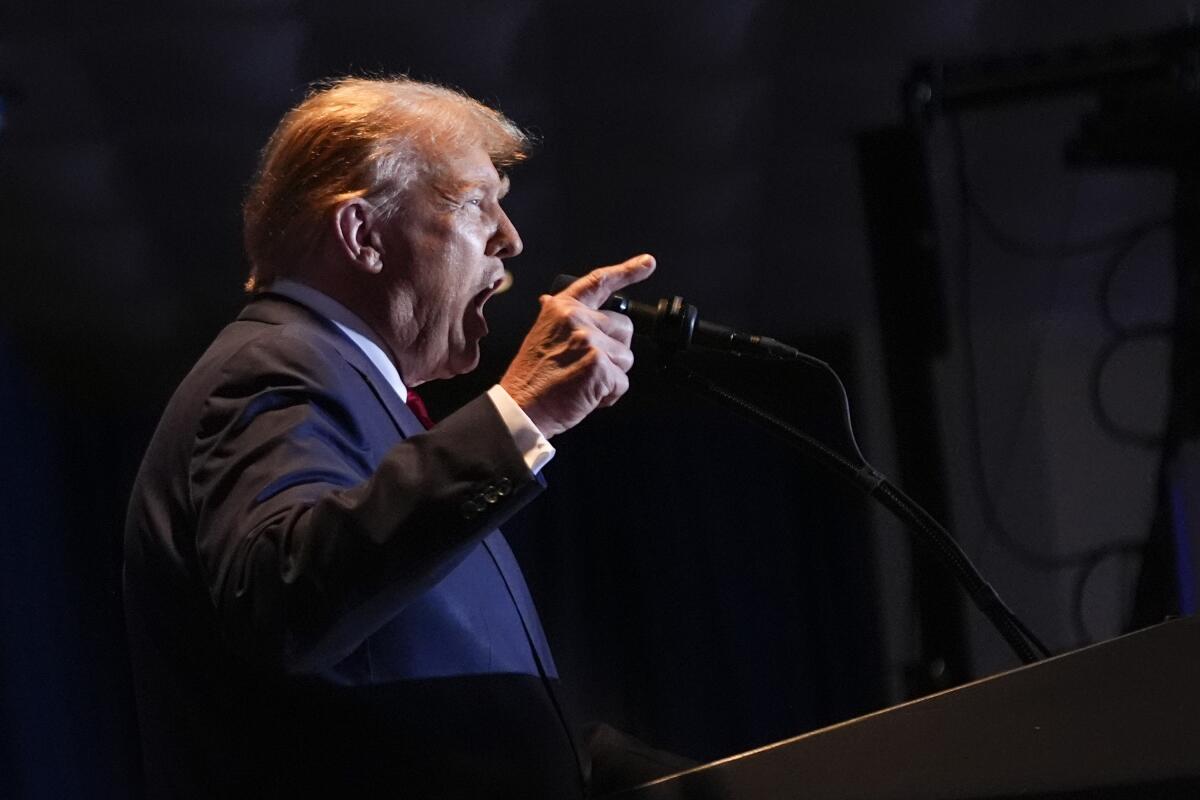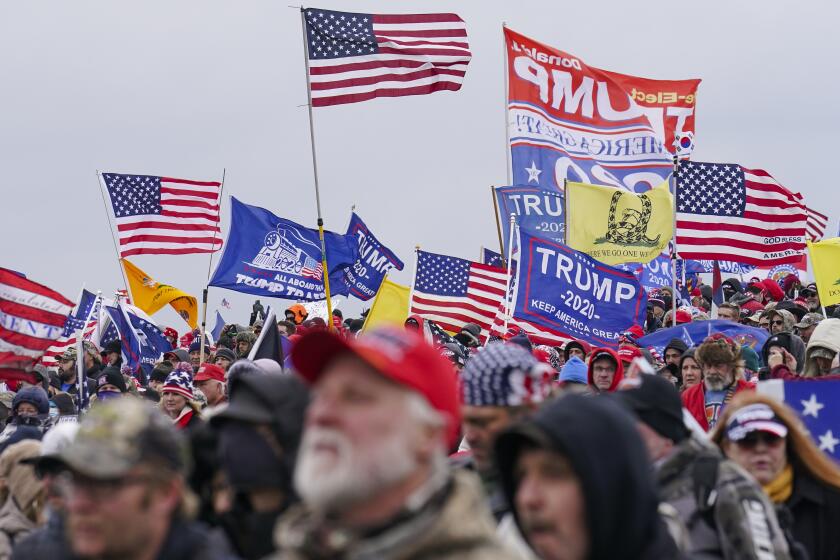Column: Without even ruling on Trump’s immunity claim, the Supreme Court handed him a huge victory

- Share via
Given the Supreme Court’s possible responses to Donald Trump’s appeal of the D.C. Circuit’s denial of his claim of immunity from prosecution, the justices’ decision Wednesday has to be counted as a gift to the former president. That’s because the court came through for him on the most important axis: time.
The court’s fairly Delphic order retains a stay on the case pending its consideration of the merits, with oral arguments scheduled for the week of April 22. Doing the math, that means the all-important election interference trial in U.S. District Judge Tanya Chutkan’s Washington courtroom will not begin for at least six months or so, around late August.
At best, that means there is no more margin for error if the case is to go forward this year. And even at the earliest possible date that it could proceed, the country will be in the homestretch of a presidential campaign that the trial would substantially distort. That’s a potential problem not just for Trump but also for the American people.
The D.C. Circuit Court of Appeals resoundingly rejected the ex-president’s claim of immunity from prosecution for trying to overturn his 2020 election loss.
And of course the trial may not begin before the November election, in which a Trump victory over President Biden would completely upend the legal and political landscape.
That’s because the trial judge can’t really abridge the amount of time that remained in the pretrial process before Trump’s appeal stopped the clock. Trump would scream that the court is violating his due-process rights if Chutkan gave the president less time to prepare his defense.
And while the Supreme Court has scheduled a fairly prompt consideration of the appeal, it’s far from the fastest they’ve ordered. Trump’s team has a full three weeks before their brief on the merits is due, and the oral argument is almost two months away.
The court’s consideration of this motion, moreover, was hardly warp speed for a case of this importance and exigency. The justices took 13 days to decide how they would handle the appeal. Again, fast — but I’ve seen faster.
In fact, the time it took had many court watchers surmising that one of the justices must be writing a dissent. But Wednesday’s order was short, bland and without dissent. (That’s not to say it was unanimous — just that no judge in the minority opted to write in opposition to the decision to take the case, which would have been unusual.)
On the other hand, the Supreme Court’s decision does not ultimately augur a reversal of the D.C. Circuit’s resounding rejection of Trump’s immunity argument. My strong sense is that the justices won’t uphold Trump’s far-reaching and fundamentally anti-constitutional claim of a wholly immune president. The opinion of the D.C. Circuit Court of Appeals — joined by Republican and Democratic appointees alike — should lay that claim to rest.
More likely than finding fault with the circuit court, the justices, probably beginning with Chief Justice John G. Roberts Jr., decided the issue is of sufficient magnitude that they couldn’t let the final decision, however persuasive, come from a lower court. Fundamental questions of executive power simply fall within the Supreme Court’s job description.
One possible clue to the court’s thinking is the order’s formulation of the question presented: “Whether — and if so, to what extent — a former president enjoys immunity from criminal prosecution for conduct alleged to involve official acts during his tenure in office.”
Throughout the case, Trump has argued that the conduct at issue fell within the outer perimeter of his official responsibilities. This depends on construing his encouragement of the Jan. 6, 2021, rioters as mere political speech.
His prospects for prevailing on that ground are negligible. In fact, several other courts have been hostile to similar arguments from Trump. For example, also on Wednesday, an Illinois court became the latest to determine that he engaged in insurrection and is therefore disqualified from the presidency under the 14th Amendment.
So even if the Supreme Court were to find some version of presidential immunity from prosecution for official acts, it wouldn’t necessarily save Trump if his conduct fell outside his responsibilities.
Again, though, Trump’s fortunes have to be measured by the time involved as well as the merits. And a pretrial back-and-forth over whether his conduct fell within his duties could take up even more time.
In the long run, therefore, the court’s decision probably won’t excuse Trump from accountability for his traitorous conduct on the merits. His outlandish claim of absolute presidential immunity will almost certainly fail, and even a recognition of limited immunity for official acts will not keep him from facing justice.
But that’s in the long run. For now, Trump is likely pleased with a result that again delays justice and, if his political gamble on a return to the White House pays off, will allow him to escape it altogether.
Harry Litman is the host of the “Talking Feds” podcast. @harrylitman
More to Read
A cure for the common opinion
Get thought-provoking perspectives with our weekly newsletter.
You may occasionally receive promotional content from the Los Angeles Times.












